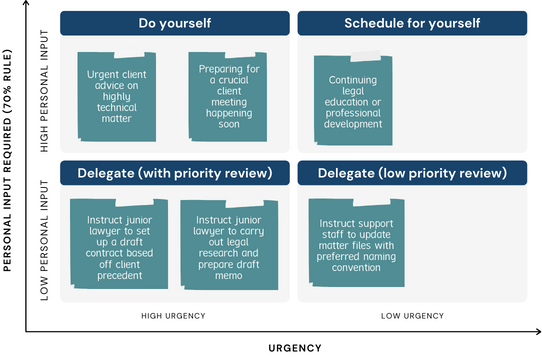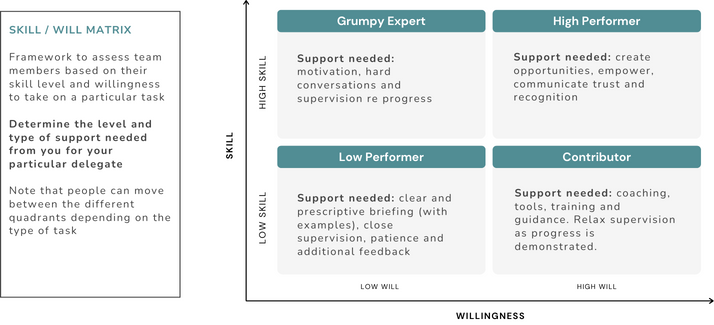A practical step-by-step guide to help lawyers develop delegation skills
Many lawyers aren’t great at delegating. To be fair, most of us were just expected to pick up that skill as we became more senior without the proper training. Or we learned from people who weren’t good managers and accepted those behaviours as normal. To help juniors develop these skills, here’s a practical step-by-step guide on delegation for lawyers.
What happens to lawyers who don’t delegate well?
Having been a lawyer for the past 8 years, I’ve seen the impact that poor delegation has on both the managers and the juniors. You’ve probably come across some of these too:
-
- The overburdened partner who does the majority of the work themselves because “only I can do it properly”.
-
- The micromanager who spends heaps of time checking on every piece of work given to team members and needing things overreported / amended in real time.
-
- The senior lawyer who doesn’t make delegation a priority so sits on tasks that come in during the morning and bombards their team members with ‘urgent’ instructions late in the afternoon.
-
- The person who doesn’t see delegation as a part of investing in others, doesn’t have the patience for feedback or training, and complains that “this cohort of juniors are useless”.
-
- The mid-level lawyer who passes tasks they don’t want to do to juniors, doesn’t check their work and blames them to seniors if there are delays or issues with the deliverable.
What proper delegation looks like
On the other hand, I’ve also seen plenty of examples of good delegation. It does take a bit more upfront work and investment, but yields real results:
-
- “John” understands that there are tasks that currently only he can do. He takes the time to work with a junior on a task, explains the process that he uses, gives clear instructions and walks through the steps together the first time. Within 6 months, his junior is able to do most of those tasks with minimal supervision, allowing John to focus on reviewing the highly technical part of the work, spend more time with his family and get onto the business development he didn’t have time for.
-
- “Jane” works with highly capable juniors. She is very comfortable with the current work allocation but knows that her juniors are ambitious and keen for career development. So, she looks for opportunities to include her juniors in tasks that would be challenging and is conscious of providing timely feedback. Some work processes have been improved where her juniors have found better ways of doing those tasks through new technology etc.
-
- “Alex” has been a lawyer for 3 years. He’s early in his career but his firm has made it clear that teamwork and effective delegation are important. He thinks about the times that seniors had delegated to him and tries to emulate the good examples while moving away from the bad ones. He gets legal secretaries and paralegals involved to try and deliver quality work while passing on the learnings from when he was doing those tasks.
I work with a lot of junior lawyers who don’t feel like they’ve done enough in their careers to start delegating. But I think it’s one of those skills we should try to develop early, or we risk not having them when we need (and get assessed on) them as mid-level and senior lawyers.
Guiding principles: delegation for lawyers
There are 5 key principles that I use to guide my delegation style:
-
- Clear communication – be clear about tasks, deadlines and expectations
-
- Skill matching – assign tasks based on team members’ strengths (or support in a learning area)
-
- Regular check-ins – be available and monitor progress
-
- Own it together – you share responsibility for the task, not pass it onto somebody else
-
- Empowerment and support – trust your team and provide support where required
I’ve found that these principles strike a balance between getting quality work product in a timely manner, while building a good relationship and helping to develop the colleagues you’re delegating to.
When should you delegate?
In a law firm, it’s best to consider whether a colleague has the skills and time to do a particular task when deciding to delegate.
Assuming they have the time, there are a few ways of thinking about this:
-
- 70% rule – if somebody can do a task at least 70% as well as you, delegate it.
-
- Competitive advantages – delegate if it frees up your time to do tasks that you are better at.
-
- Eisenhower matrix (adapted for law firms) – consider the personal input required from yourself as well as the urgency of the task.

We’ve touched on the benefits of delegating earlier, but the longer-term effects of delegation could include:
-
- Reduce your workload for high value activities;
-
- Training and development of delegate;
-
- Create opportunities for growth;
-
- Build relationship with delegate; and
-
- Collaboration and potential improvements to work processes from delegates who are closer to the detail.
So, try not to think too short-term when considering whether to delegate a task or not.
Approach to delegation for lawyers – step-by-step
There are 6 steps that I’ve learned to follow when delegating:
-
- Confirm whether you can delegate
-
- Estimate how long the task will take
-
- Give clear instructions
-
- Understand you’re responsible for the final work product
-
- Take the blame, give the credit
-
- Provide feedback
We’ll go over each of these below:
1. Confirm whether you can delegate
As a junior, it’s usually assumed that you’ll be doing the work yourself unless your supervisor tells you otherwise. But you should also keep an eye out for things that could be delegated for time / cost reasons (e.g. document formatting or working with your secretary)
“Hi Jane, just wanted to check if we should get John to help out with [preparing that legislation flowchart]. He was really good with that research task last time.“
2. Estimate how long the task will take
If you’ve got a deadline, think about the time you’ll need to review / amend the delegated work (as well as doing your part). Then check if the other person has the capacity to do the delegated work in the remaining time.
As a general rule:
-
- Don’t sit on tasks – make delegation a priority;
-
- Give yourself enough time to review (and ideally, time for them to fix after your review); and
-
- Update your team if there are deadline extensions (so they can reprioritise more urgent work if needed).
“Hi John, I’ve got this task that I’m hoping you can help with. Ideally, I can get your part back by [3pm tomorrow]. Do you have time to do this?“
3. Give clear instructions – checklist
With any task, you should try to set out the following things:
-
- Background – Who are you acting for? Key documents facts about the matter?
-
- Deliverables – What do you need from your colleague, and in what form? Email, formal memo, mark ups to a document, or a quick chat?
-
- Timing / budget – When do you need the task completed to review?
-
- Expectations – What particular areas do you expect them to get right (e.g. formatting and inserting factual background), and what do you expect to review
Ideally, you can also explain how the delegated part fits in with the other work and provide an example (e.g. for a table, you might populate the first few rows).
For more complex tasks, it’s generally better to email written instructions instead of just relying on a conversation.
Support required
As part of framing the expectations part of your instructions, you should also consider the skills / attitude of your delegate. The “Skill / Will Matrix” is handy to give a general idea of the type of support that your delegate may need from you.

4. Understand that you’re responsible for the final work product
Delegation is a responsibility itself, not a way to shift responsibility onto somebody else.
Got somebody to help with a formatting task? Scroll through the document to make sure it’s correct.
Changing party names in precedent contracts? Do a spot check to make sure nothing was missed.
As a general rule:
-
- Do a comprehensive review in the areas where you can add the most value (e.g. technical expertise)
-
- Spot check areas that are within your delegate’s skill set
-
- Where possible, provide examples where the work can be improved and give them a chance to fix
5. Take the blame, give the credit
If a delegated task isn’t done well – it’s still ultimately your work product. There shouldn’t be any finger pointing or blaming your delegate to a senior.
If the work product is bad – “sorry, I should have checked the work more carefully”.
You should give feedback to your delegate, but that’s a separate discussion.
If they did a good job? Proactively relay that to your supervisor (“Thanks, John was actually a huge help on this task.”)
6. Giving feedback
Offer to give feedback, especially where you’ve made significant amendments. The focus should be on what you changed, but also WHY you made those changes.
“Hey John, thanks for helping out with that advice. I’ve copied you into the final version that I sent to the client. If you wanted to run a compare against your draft, I’m happy to walk you through any changes that you don’t understand.”
It’s helpful to provide high level feedback immediately (or as soon as possible). This can be limited to (up to) 3 things that were done well, and 3 things that could be improved.
For important / complex tasks, or if your delegate didn’t do a good job, a detailed feedback session would be helpful. You could look at a compare of their draft against the finalised work product, work through their process and identify the changes made plus the reasons for those changes.
Final thoughts
Delegation is a skill. The sooner we start training it, the better the results we’ll produce for ourselves and our team when we transition from juniors to supervisors.
It’s not always easy, but it’s an investment that really pays off if you follow a good example and reasonable process like in this guide.
Our sponsor for this guide – Athena
This guide to delegation for lawyers is sponsored by Athena – the delegation company that matches busy legal professionals with trained executive assistants and world-class delegation coaching for $3K per month.
Athena understands that a busy lawyer’s most valuable asset is time. So they work to understand your business and your goals, use the latest AI tools and give you access to 100s of member-only playbooks to keep you and your assistant on the cutting edge.
Exclusive offer for Practising Law readers: You can use my link here to get $1500 in credit.